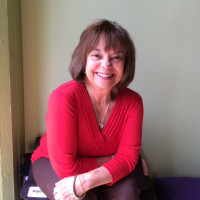by Kara-Leah Grant
Meet Judith Hanson Lasater. A yoga teacher since 1971, and the co-founder of Yoga Journal, Judith is a physical therapist, and holds a PhD in East West psychology.
She’s also written eight books and recently released a second edition of her popular book Living Your Yoga: Finding the Spiritual in Everyday Life.
(The first edition was released in 1999.)
 That was a great excuses for me to hit up Rodmell Press (her publishers) about interviewing Judith, and I was very happy to hear she’d said yes.
That was a great excuses for me to hit up Rodmell Press (her publishers) about interviewing Judith, and I was very happy to hear she’d said yes.
It’s a great honour to have the opportunity to speak to someone like Judith, and I could have quite happily chatted on for a few hours.
We’ve extracted a few juicy quotes down below, but you’ll need to listen to the full interview to imbibe of all Judith’s wisdom.
Judith Hanson Lasater on What it Really Means to Live Your Yoga
On the release of the second edition of Judith’s book ‘Living Your Yoga’:
“It’s fifteen years since 2000…I’ve grown… and I wanted to add three new chapters that reflected where I was now in my practice of becoming the yoga, and living the yoga.”
“I believe that if we stay up in our yoga room and we do the perfect headstand, that doesn’t necessarily create the kind of world we want to live in. What makes this practice so valuable is when we live it.”
On empathy (one of the new chapters):
“Empathy is understanding independent of agreement. I don’t have to agree with you to understand the causes and conditions that shaped you to make the decisions you have made… If I can have empathy for that then we can connect on a human level and solve our problems.”
“A mantra of daily living that I like a lot is to say this to myself “How human of me.” How human of me to want to improve, how human of me to judge myself.”
“When we make progress internally is when we listen. It’s when we soften. It’s when we evoke, and allow, and invite the practice into us as we become the container.”
On worship (another new chapter):
“There are many ways to feel connected to divinity, to God, to the whole… To the fact that this life is nothing but a sacred journey.”
On how Judith defines her yoga practice:
“A practice is something that makes you remember the whole.”
“It can be really simple, like just remembering to breathe… to remember to let go, to stop defending, to be present…”
“Practice can be asana, it can be listening to music, it can be pranayama, it can be lying on the floor and just being there, it can be having a delicious interaction with nature or with a child…”
On her introduction to yoga:
“After my first yoga class I started reading about it and I embraced every part of it, the devotional aspect, the chanting, the pranayama. This was in September of 1970. I went to (yoga) class every day and by July my two teachers moved away and they asked me to take over their classes. … Literally overnight I took over a two hundred person yoga program.”
On how she took her yoga off the mat:
“I love asana, and I’ve done it virtually every day of my life since 1970… But it’s not enough.”
“Asana is a tool to help us see the choice that we always have in every moment… And that everything that I do and say, from a small decision to a big decision, spreads out in the world.”
On the modern yoga world:
“I find that often the younger people who come to class cannot even lie for five minutes without wanting their phone or looking around… It’s harder and harder to just understand being. You and I live in doing cultures, and we need to balance that with introversion and silence, and spaciousness.”
“When I was in my twenties my practice was so much about the movement, the achievement… It was about the movement and not about the stillness.”
“A mature student understands that the asana is not the yoga. Yoga is the residue that the asana leaves in our body, mind and spirit. That is yoga.”
‘Too often we are just training teachers to teach information, and not to trust teaching from the heart.”
On the job of yoga teachers:
“The job of a yoga teacher is to mirror back the inner wisdom and inherent goodness of each human being, and to create an environment where people discover their own goodness.”
“Our job is to speak our truths, what we know in ourselves, and offer it as a devotional act to these other beings in a way that makes their life more wonderful, and offers them the possibility of no longer being a prisoner of their thoughts.”
“I think the most important thing that any human being can learn… is the power of dis-identifying with one’s thoughts. Because all suffering comes from believing our thoughts.”
“If I could wave my magic wand, heck if I could find my magic wand, I would say that to be a yoga teacher would require the equivalent of four years college.”
You can find out more about Judith on her website by clicking here.
You can find Living Your Yoga on Amazon here.

Another gem of an interview!
I know – how privileged am I to interview such awesome people?!